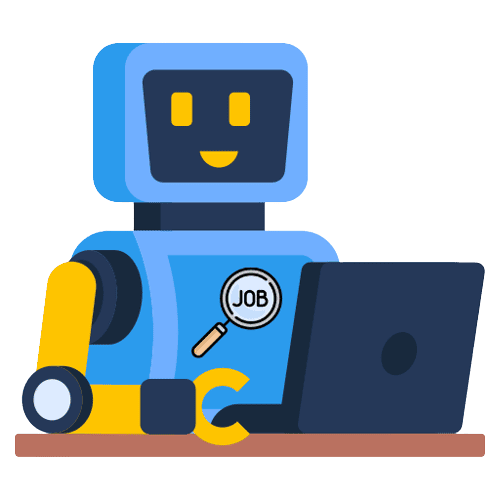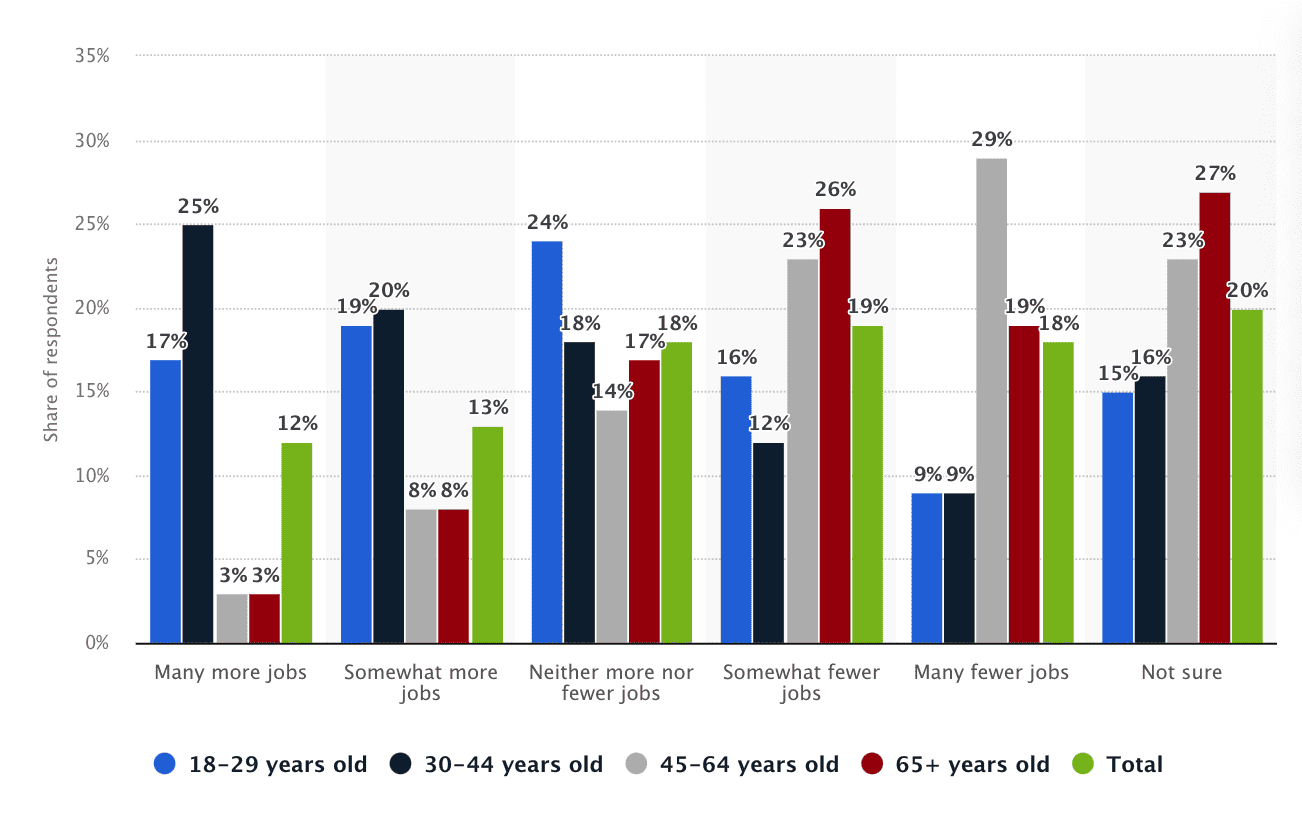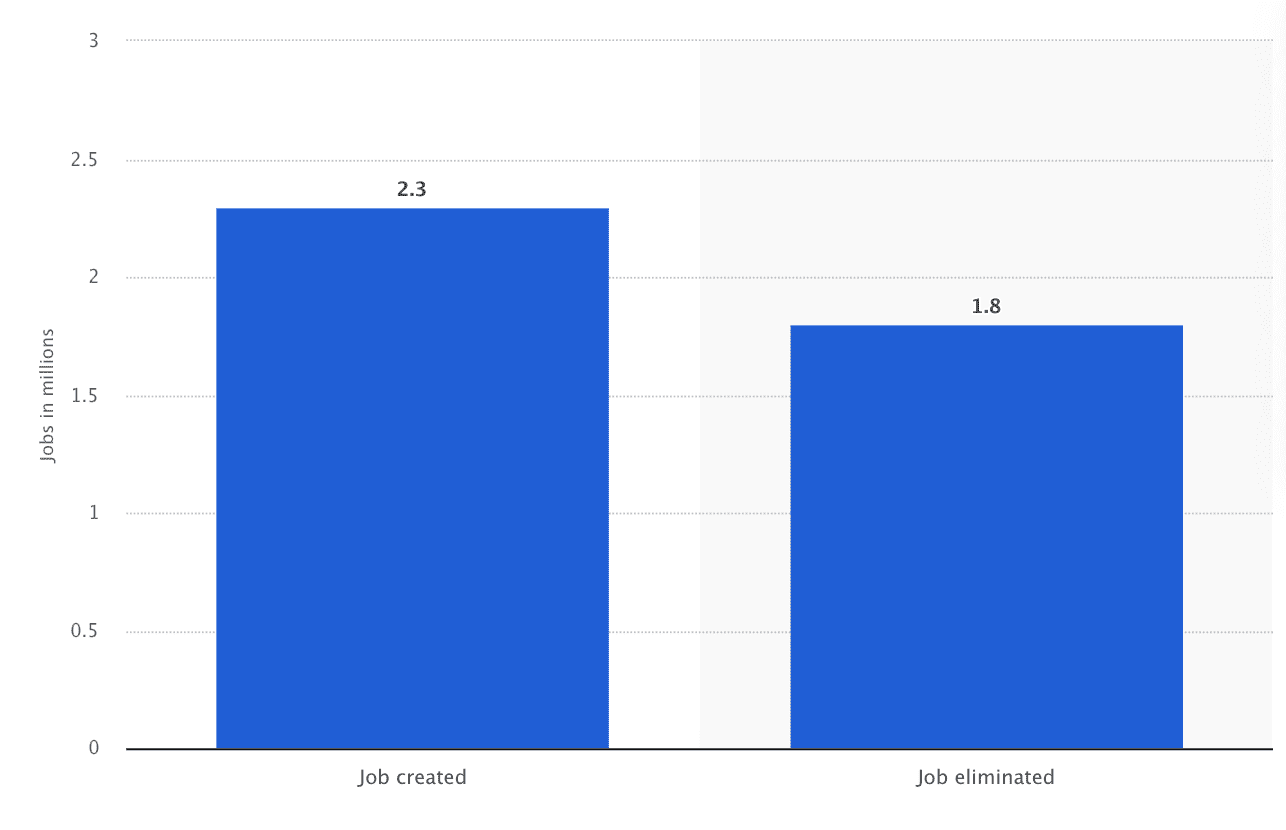AI Jobs Statistics 2023 [The Impact on The Job Market]
Artificial Intelligence (AI) has been making waves in various industries, and the job market is no exception.
As we enter 2023, AI continues to revolutionize the way businesses operate, and job seekers must stay up-to-date with the latest developments.
But what does this mean for the job market, and how can companies and job seekers take advantage of this technology? And how will this technology impact work in the future?
In this article, we will explore the latest AI jobs statistics on its impact on jobs, shedding light on the opportunities and challenges that lie ahead.
- , AI

Top AI Jobs Statistics
- The rapid growth of AI is expected to have a significant impact on the job market. It is projected that by 2025, AI will eliminate 85 million jobs while simultaneously creating 97 million new ones.
- The rapid adoption of AI has led to predictions of job displacement, with up to 375 million jobs at risk in the next decade
- According to a McKinsey & Company survey, 45% of work activities can be automated using current technology, potentially leading to job losses or a shift in the types of skills required by the labor market.
- Due to AI, 6-9% of people will be working in professions that don’t yet exist by 2030.
- While nine out of ten of the most successful companies have made investments in AI technology, less than 15 percent of these companies really use AI capabilities in their operations.
- Just 19% of individuals believe that AI will increase workplace efficiency.
- For successful completion of the task, 28% of people think that human contact is still necessary.
- By 2023, there will be a 20% growth in AI-performed activities in the healthcare sector.
- According to 73% of employees, automation and AI won’t make people obsolete in their existing positions.
- 800 million jobs globally might be replaced by AI by 2030.
- During the next five years, job descriptions are expected to undergo moderate-to-considerable modifications, according to two-thirds of CEOs.
- China is expected to lose 42% of its jobs to automation and AI adoption worldwide.
- According to 77% of CEOs questioned, automation and AI would result in a net loss of employment.
- In the next two decades, artificial intelligence (AI) might replace 57% of all employment that pays less than $20 per hour.
- By 2030, jobs carried out by AI and humans will be divided roughly evenly, with AI performing 50% of tasks.
- By 2025, AI, machine learning, and data analytics are expected to generate around 133 million new jobs worldwide according to World Economic Forum
- The global workforce could see up to 14% job losses by 2030 due to AI and automation, according to estimates.
- 82% of restaurant positions are at risk of automation, including 51% of server positions, 57% of fast-food and counter workers, 38% of waiter and waitress positions, and 21% of cooking and food prep positions.
- The adoption of robotics in the restaurant industry can lead to significant labor cost savings, with estimates ranging between 30-70%.
- Up to 82% of restaurant positions could be replaced with robots, which is a significant concern given the industry’s existing labor shortage.
- 90% of restaurants are considering the implementation of robotic technology to improve efficiency and reduce labor costs.
- AI is projected to create job growth in various sectors, such as health (22%), scientific and technical services (16%), and education (6%).
- Conversely, certain sectors may see a decline in job availability due to AI, including manufacturing jobs by 25%, transport and storage jobs by 22%, and public administration jobs by 18%.
Impact of AI on Job Growth
AI has had a profound impact on job growth, with some jobs being replaced by machines while others are being transformed. Despite concerns over job displacement, AI has also created new job opportunities, particularly in the areas of data analysis, machine learning, and programming. The long-term impact of AI on job growth remains to be seen.
AI has the potential to create 97 million jobs, but it may also displace up to 375 million jobs in the next decade (Zippia)
The adoption of AI has led to predictions of job displacement, with up to 375 million jobs at risk in the next decade. Nonetheless, the technology could also create 97 million new jobs, with businesses creating positions focused on creativity. It will be crucial for companies to swiftly train and reposition employees to avoid a significant economic impact and help them learn new skills.
AI, machine learning, and data analytics could generate 133 million jobs by 2025 (Market Splash)
The World Economic Forum estimates that the adoption of AI, machine learning, and data analytics technologies could result in the creation of over 133 million new jobs globally by 2025. These technologies have the potential to transform multiple industries and create new job opportunities.
Perceptions of the impact of artificial intelligence on employment in the United States in 2022, broken down by age group (Statista)

| Expected Impact of AI |
18-19 Yrs Old |
30-44 Yrs Old |
45-64 Yrs Old |
65+ Yrs Old |
Total |
|
Many more jobs |
17% |
25% |
3% |
3% |
12% |
|
Somewhat more jobs |
19% |
20% |
8% |
8% |
13% |
|
Neither more nor fewer jobs |
24% |
18% |
14% |
17% |
18% |
|
Somewhat fewer jobs |
16% |
12% |
23% |
26% |
19% |
|
Many fewer jobs |
9% |
9% |
29% |
19% |
18% |
|
Not sure |
15% |
16% |
23% |
27% |
20% |
How Do Respondents Believe AI will Impact Their Jobs?
According to a survey conducted among European advertisers, publishers, and agencies, the following were the key takeaways regarding their opinions on the impact of artificial intelligence on their jobs:
- 42% of respondents believed that AI would reduce repetitive processes and provide more time to make strategic decisions.
- 40% of respondents stated that AI would improve access to relevant data, making decision-making easier.
- 15% of respondents expressed positivity about AI’s potential but were unsure of its impact on their jobs.
- Only 3% of respondents viewed AI as a threat to their jobs.
How is Artificial Intelligence Transforming Jobs?
Artificial intelligence is transforming jobs by automating routine and repetitive tasks, augmenting human capabilities, and creating new roles that require AI skills. It is also enhancing decision-making and improving customer experiences. While some jobs may become obsolete, AI is creating opportunities for workers to develop new skills and take on more fulfilling work.
By 2025, the adoption of AI in enterprise applications is expected to increase to 75%, compared to 10% in 2018 (Gartner)
The growth of AI in enterprise applications is expected to skyrocket in the next few years, with 75% of such applications projected to use AI by 2025, up from just 10% in 2018. This demonstrates the increasing impact and importance of AI in transforming the way businesses operate and compete. In fact, AI is used by 37% of top companies.
The adoption of AI is projected to lead to the creation of 133 million jobs worldwide by 2025, despite the elimination of 75 million jobs, resulting in a net gain of 58 million jobs (World Economic Forum)
According to the World Economic Forum AI is anticipated to have a significant impact on the job market, leading to both job creation and job displacement. Specifically, by 2025, the use of AI is expected to create 133 million new jobs worldwide while eliminating 75 million jobs. This is projected to result in a net gain of 58 million jobs.
How are Companies Adapting to AI?
As AI technology continues to advance, companies are increasingly adapting to it by integrating AI tools and applications into their operations. This includes hiring AI and machine learning engineers, upskilling current employees, and automating processes to increase efficiency.
Many companies are also using AI to improve customer service, optimize supply chains, and analyze data for better decision-making. To stay competitive in a rapidly evolving landscape, companies must continue to adapt and embrace AI technology.
Capital One is investing in AI and upskilling current engineers, with Bose reporting over 100 engineers trained in their six-month program (Washington Post)
As companies continue to adopt AI technology, there is a growing need for employees to be equipped with the necessary skills to work alongside these advanced tools. RBC is one such company, encouraging workers to familiarize themselves with AI tools to increase productivity and efficiency.
Meanwhile, Capital One and Bose are taking a different approach by investing in the upskilling and training of their current engineering staff, ensuring they have the knowledge to develop and implement AI solutions.
These strategies not only benefit the companies but also provide employees with opportunities to expand their skill sets and remain competitive in the job market.
Benefits of AI in Jobs
AI can improve decision-making and operational efficiency, automate repetitive tasks, and enhance customer experiences, freeing up workers to focus on more complex tasks, leading to increased productivity and job satisfaction.
The use of AI can provide numerous benefits, such as improving operations and decision-making processes while freeing up workers to focus on more complex tasks (Deloitte Insights)
|
Tasks Performed By AI |
Percentage |
|
Enhance products and services |
43% |
|
Optimize internal business operations |
41% |
|
Make better decisions |
34% |
|
Automate tasks to free up workers to be more creative |
31% |
|
Optimize external processes |
31% |
|
Create new products |
28% |
|
Pursue new markets |
27% |
|
Capture and apply scarce knowledge |
26% |
|
Reduce headcount through automation |
24% |
AI Experts: The Most In-Demand Professionals
The rise of AI has led to AI experts being the most sought-after professionals. Their skills and expertise are in high demand in various industries worldwide (Deloitte Insights)
|
Profession |
Percentage of Demand |
|
AI Researchers |
30% |
|
Software Developers |
28% |
|
Data Scientists |
25% |
|
Project Managers |
23% |
|
Business Leaders |
22% |
|
Change Management Experts |
22% |
|
User Experience designers |
21% |
|
Subject-matter Experts |
20% |
Future of Artificial Intelligence in Jobs
The future of artificial intelligence in jobs is a topic of great concern as technology continues to advance at a rapid pace. The increasing adoption of artificial intelligence is transforming the job landscape. While it poses a threat to some jobs, new ones will be created that require different skills. The need for individuals and businesses to adapt and acquire new skills is crucial for success in this changing environment.
Goldman Sachs report predicts AI automation could impact 300 million jobs worldwide (CNBC)
According to a report released by Goldman Sachs on March 26, 2023, artificial intelligence and automation could impact up to 300 million jobs worldwide. The report emphasizes the need for companies and governments to invest in retraining and education programs to equip workers with the skills needed for the jobs of the future.
Within the next 15 years, up to 40% of global jobs may be performed by machines, as artificial intelligence continues to advance (Fox Business)
According to AI expert Kai Fu Lee, up to 40% of jobs could be automated in 15 years, including traditionally safe jobs in the culinary and hospitality industries. This emphasizes the need for individuals and businesses to adapt by developing new skills and career paths.
The issue of AI’s impact on the future of work is critical and requires immediate attention from industry leaders, educators, and governments. It’s imperative to invest in reskilling programs and foster innovation to ensure a successful transition to a highly automated workforce.
Automation to Replace Millions of Jobs: 20M manufacturing jobs at risk by 2030, 25% US jobs susceptible, 49% of Japan’s workforce, and 30% of UK jobs at risk (Gitnux)
As the implementation of automation and artificial intelligence (AI) in the workforce becomes increasingly widespread, concerns have been raised about the potential displacement of human workers.
Studies indicate that by 2030, 20 million manufacturing jobs could be lost due to automation, and a quarter of American jobs are highly susceptible to being replaced by AI, potentially leading to the loss of 73 million jobs in the country within the next five years.
Similarly, Japan’s workforce is estimated to be 49% replaced by AI or robotic machines within 10-20 years, while in Britain, 30% of jobs are at risk of being replaced by AI, with higher percentages for male workers than for female workers.
AI will create 2.3 million jobs while eliminating 1.8 million jobs (Statista)
It is estimated that AI will lead to the creation of 2.3 million jobs and the elimination of 1.8 million.
Challenges of AI in Jobs
45% of work activities can be automated with current technology, leading to skill shifts or job losses (McKinsey & Company)
A survey by McKinsey & Company found that 45% of work activities can be automated using current technology, leading to potential job losses or a shift in the types of skills demanded by the labor market. Additionally, studies have shown that AI algorithms can reflect and amplify biases in hiring and job selection, leading to concerns about fairness and equity in the workplace.
38% of AI-using companies experienced data security breaches, emphasizing the need for safeguards (Deloitte Insights)
A survey conducted by Deloitte found that 38% of companies using AI have experienced data privacy and security breaches, highlighting the need for effective safeguards to protect sensitive information. As the use of AI continues to grow, it is crucial for businesses and policymakers to address these challenges and ensure that the benefits of AI are distributed equitably.
Enterprise Artificial Intelligence Market Size
Enterprise AI refers to the application of AI techniques that can incorporate human learning, perception, and interaction abilities to assist businesses in predicting financial outcomes with a high degree of complexity. To stay competitive, companies are increasingly adopting enterprise AI to enhance their decision-making processes and gain a strategic advantage.
The market for enterprise artificial intelligence (AI) was valued at USD 16.81 billion in 2022 and is expected to grow at a CAGR of 47.16% to reach approximately USD 102.9 billion by 2030 (Precedence Research)
The market for enterprise artificial intelligence (AI) was valued at USD 16.81 billion in 2022 and is expected to witness substantial growth during the forecast period from 2022 to 2030, at a CAGR of 47.16%.
AI Jobs Statistics Final Words
In conclusion, the impact of artificial intelligence (AI) on the job market is substantial and will continue to be felt in 2023 and beyond. While AI has the potential to revolutionize the way businesses operate and improve efficiency, it also poses challenges to existing job roles and the need for reskilling and upskilling. Despite concerns over job displacement, AI has also created new job opportunities in areas such as data analysis, machine learning, and programming. It is crucial for companies and job seekers to stay up-to-date with the latest AI developments and adapt to remain competitive in the job market. The future impact of AI on job growth remains uncertain, but with careful planning and investment, AI has the potential to create a net positive effect on the job market.
References
- Abril, D. (2023, March 20). AI isn’t yet going to take your job — but you may have to work with it. The Washington Post. https://www.washingtonpost.com/technology/interactive/2023/ai-jobs-workplace/
- Tietz, K. (2023, March 29). Will artificial intelligence take over jobs? Careers across varying fields could be at risk. Fox Business. https://www.foxbusiness.com/media/will-artificial-intelligence-take-over-jobs-careers-across-varying-fields-could-risk
- How AI is Replacing Jobs 2023: A Look at the Statistics. (2023, March 23). Gitnux. https://blog.gitnux.com/ai-replacing-jobs-statistics/
- Sonoda, D. (2023, February 8). 2022 AI survey reveals AI’s impact on productivity. Blumberg Capital. https://blumbergcapital.com/2022-ai-survey-reveals-ai-impact-on-productivity-in-workplace-and-customer-service/
- Kiderlin, S. (2023, March 28). Goldman Sachs says generative A.I. could impact 300 million jobs — here’s which ones. CNBC. https://www.cnbc.com/2023/03/28/ai-automation-could-impact-300-million-jobs-heres-which-ones.html
- Enterprise artificial intelligence (AI) market report 2030. (2022). Precedence Research – Market Research Reports & Consulting Firm. https://www.precedenceresearch.com/enterprise-artificial-intelligence-market
- Kolmar, C. (2023, February 7). 23+ artificial intelligence and job loss statistics [2022]. Zippia – Find Jobs, Salaries, Companies, Resume Help, Career Paths and More. https://www.zippia.com/advice/ai-job-loss-statistics/
- Govender, S. (2023, March 23). 120+ AI statistics: How the game is changing in 2023. MarketSplash. https://marketsplash.com/ai-statistics/
- B2B marketing powered by AI. (2022, August 9). AI bees | B2B Marketing Powered by AI. https://www.ai-bees.io/post/how-artificial-intelligence-impacts-the-future-of-work
- Meulen, R. (2018, October 3). What edge computing means for infrastructure and operations leaders. Gartner. https://www.gartner.com/smarterwithgartner/what-edge-computing-means-for-infrastructure-and-operations-leaders
- Don’t fear AI. The tech will lead to long-term job growth. (2020, October 26). World Economic Forum. https://www.weforum.org/agenda/2020/10/dont-fear-ai-it-will-lead-to-long-term-job-growth/
- AI’s global impact on job creation and elimination 2022. (2017, December 13). Statista. https://www.statista.com/statistics/791992/worldwide-jobs-creation-elimination-due-to-ai/
- U.S.: Opinions on artificial intelligence’s impact on jobs by age 2022. (2022, December 30). Statista. https://www.statista.com/statistics/1357711/opinions-on-artificial-intelligence-impact-on-jobs-by-age-us/
- AI will create as many jobs as it displaces – report. (2018, July 16). BBC News. https://www.bbc.com/news/business-44849492
- Hupfer, S. (2020, March 3). Talent and workforce effects in the age of AI. Deloitte Insights. https://www2.deloitte.com/us/en/insights/focus/cognitive-technologies/ai-adoption-in-the-workforce.html
- European advertisers, publishers & agencies feel about how artificial intelligence will impact their jobs, 2018. (2019, February 19). Digital Marketing Community. https://www.digitalmarketingcommunity.com/indicators/impact-of-artificial-intelligence-on-advertisers-jobs-2018/
- Todorov, G. (2021, February 26). 65 artificial intelligence statistics for 2021 and beyond. Semrush Blog. https://www.semrush.com/blog/artificial-intelligence-stats/
Patryk Miszczak


